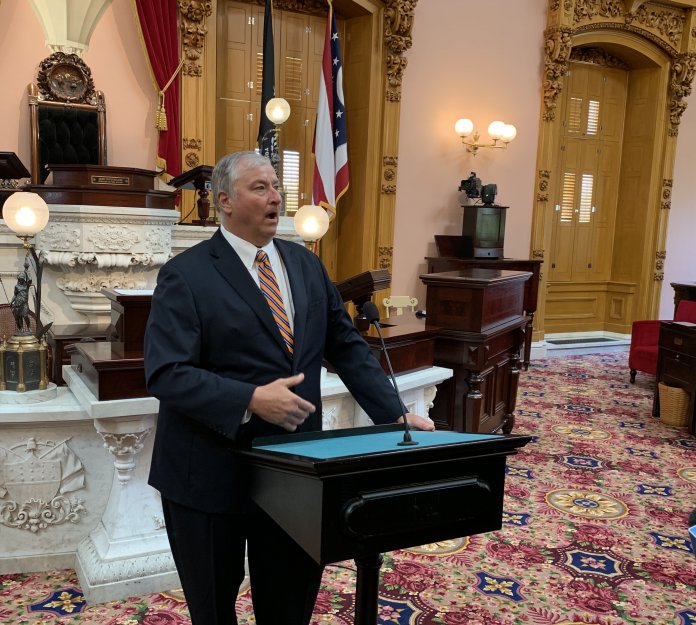Ohio Capital Journal
The Ohio House of Representatives passed a bill Thursday that offers health care providers and general businesses a powerful shield from lawsuits related to COVID-19.
House Bill 606 would offer qualified immunity — protection from litigation — to health care providers like first responders or nursing homes during a declared disaster or emergency. The provider would not be liable to lawsuits or professional discipline if their act, or lack of action, leads to death or injury.
To bring a lawsuit, a claimant would need to prove the action (or lack thereof) that caused injury or death constituted a “reckless disregard” for the consequences, intentional conduct, or “willful or wanton misconduct.”
According to data released Wednesday from the Ohio Department of Health, 1,073 residents of long-term care facilities have died from COVID-19 since April 15 when ODH published its database. HB 606 would raise the bar for relatives to bring a claim against a facility.
The bill also prohibits people from filing lawsuits against general businesses based on injury or death from COVID-19 unless they can establish that contraction of the virus was caused by “reckless” or intentional conduct, or that the business in question acted with “willful or wanton misconduct.”
Supporters of the legislation referred to it as a compromise position, comparing it to earlier drafts of the bill that called for a higher standard of legal evidence to determine whether a business was negligent and a broader scope for immunity defenses.
House Majority Leader Bill Seitz, R-Cincinnati, said it offers businesses seeking to operate safely some protection against plaintiff’s lawyers filing “frivolous” lawsuits. He characterized such lawyers as unscrupulous trial lawyers seeking to exploit a pandemic for quick and easy settlements.
Critics of the bill said the legislation protects businesses who flout basic public health guidelines to stave off the disease, enticing them away from safe practices.
Rep. Michael Skindell, D-Lakewood, voted against the bill. He cited an Insurance Journal report detailing how few lawsuits have been filed regarding the pandemic, and how businesses are exaggerating fears of a flood of litigation given the difficulty in proving where someone became infected.
The outlet, citing a law firm’s analysis, found just 45 personal injury lawsuits nationwide. About 1,000 other coronavirus-related lawsuits tie to prisoners seeking release, insurance disputes, lending, tuition and ticket refunds. Skindell said the meager amount of personal injury lawsuits and details behind them are telling.
“Of the 45 cases, 28 were against Princess Cruise Lines. The rest were against three other cruise lines, two meat processing companies, Walmart Inc., a senior living facility operator, two care centers, a hospital and a doctor’s group,” the article states.
The bill now heads to the Senate, which has been honing similar legislation of its own.
During floor proceedings, the House adopted an amendment from Rep. Brigid Kelly,which gives workers in grocery stores, food packing and processing facilities, peace officers, fire fighters, emergency medical workers and correctional officers access to workers’ compensation if they contract COVID-19 while on the job.
In committee hearings, a long train of organizations representing business and commercial interests expressed their support for the legislation.
“Mitigating an employer’s risk will aid Ohio’s economic comeback by removing an obstacle to reopening and an incentive for businesses to remain closed,” said Kevin Shimp, a lobbyist with the Ohio Chamber of Commerce. “Likewise, rather than substantially limiting their business operations due to fear of litigation, businesses can focus on serving their customers like they did prior to the pandemic if they have the protections afforded to them in HB 606.”
A group representing trial lawyers issued a letter to its members after passage of HB 606, arguing the bill is essentially the best version of a bad idea.
“Please allow me to be direct. This is not an ideal bill,” wrote Brad Ingraham, director of governmental affairs for the Ohio Association for Justice. “However, given the state and national momentum for immunity, the bill, as passed by the House, is a rational compromise. Our work has been strategic, thoughtful, and effective. We have shared the dangerous consequences of immunity at every step in the process.”
***
More from Ohio Capital Journal:
DeWine somewhat eases testing limits as Trump falsely claims states have unlimited testing
As he leads the state through a historic pandemic, Ohio Gov. Mike Dewine has an apparently unbreakable rule: Don’t cross Trump.
In his press conference Thursday, DeWine again addressed the inadequacy of Ohio’s coronavirus testing program.
For example, he announced a fourth tier of Ohioans who are now eligible for state tests. People who have coronavirus symptoms, regardless of whether they have compromised health or meet earlier criteria, can now receive tests administered by the Ohio Department of Health, DeWine said.
That leaves Ohio a long way from having enough capacity to allow testing so people can be sure it’s safe for them to visit loved ones who are particularly at risk. READ MORE





